 Toyota Yaris: Air conditioning filter
Toyota Yaris: Air conditioning filter
The air conditioning filter must be changed regularly to maintain air conditioning efficiency.
■ Replacement method

Turn the engine switch to the “LOCK” position.
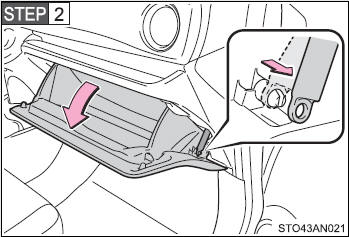
Open the glove box. Slide off the damper.
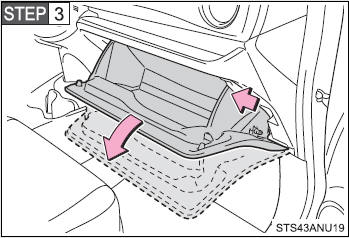
Press the outer facing side of the glove box to disconnect the upper claws.
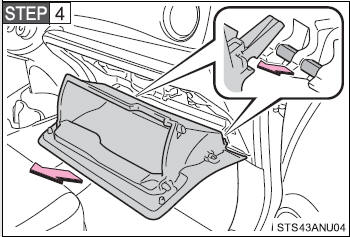
Pull out the glove box and disconnect the lower claws.
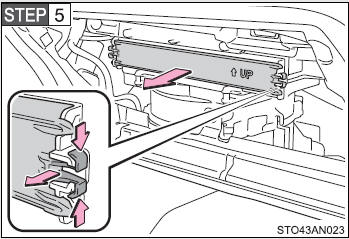
Remove the filter cover.
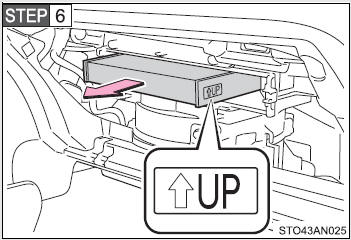
Remove the air conditioning filter and replace it with a new one.
The “↑UP” marks shown on the filter should be pointing up.
■Checking interval
Inspect and replace the air conditioning filter according to the maintenance schedule. In dusty areas or areas with heavy traffic flow, early replacement may be required. (For scheduled maintenance information, please refer to the “Scheduled Maintenance Guide” or “Owner’s Manual Supplement”.)
■If air flow from the vents decreases dramatically
The filter may be clogged. Check the filter and replace if necessary.
NOTICE
■When using the air conditioning system
Make sure that a filter is always installed. Using the air conditioning system without a filter may cause damage to the system.
 Wheels
Wheels
If a wheel is bent, cracked or heavily corroded, it should be replaced. Otherwise,
the tire may separate from the wheel or cause a loss of handling control.
■ Wheel selection
When replacing ...
 Wireless remote control battery
Wireless remote control battery
Replace the battery with a new one if it is depleted.
■ You will need the following items:
● Flathead screwdriver
● Lithium battery CR2016
■ Replacing the battery
Type A
...
See also:
Instrument panel light control
To adjust the brightness of the instrument panel lights, turn the dial.
With the dial turned fully up, the intensity of the instrument panel lights will
not be reduced even when the tail lights ...
Suspension and chassis
CAUTION.
Do not modify the suspension/chassis with lift kits, spacers, springs, etc. It
can cause dangerous vehicle handling characteristics, resulting in loss of control.
...
Windshield wiper and washer
The wiper operation is selected by moving the lever as follows:
Type A
Intermittent windshield wiper operation
Low speed windshield wiper operation
High speed windshield wiper operation
...
